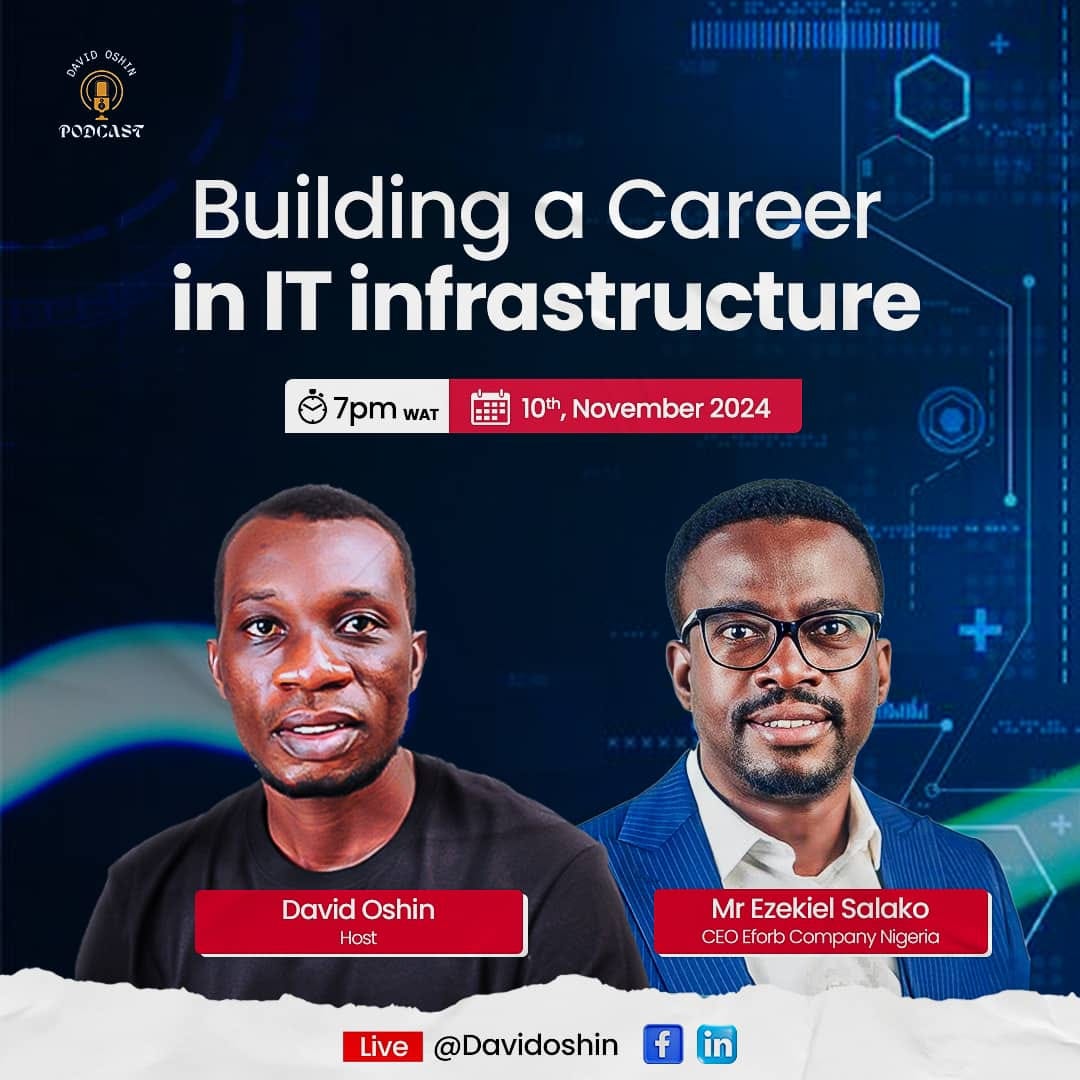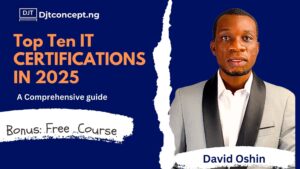The ultimate guide to build a career in IT Infrastructure with Ezekiel Salako.
Mr Ezekiel has been in the IT Space in Nigeria for over 20 years having worked with the biggest companies, banks, telcos and many more.
In our conversation, he explains
✅How to begin your career in IT
✅Find your passion and interest in IT
✅The rapidly evolving nature of It and the need to stay on top of your game
✅The reasons for major attacks on big organizations including banks and negligence of staffs
✅ How to get to the very top of your IT career
Listen now
Some Key Takeaways
✅Identify your area of interest: Salako Ezekiel emphasized the importance of identifying one’s area of interest in IT infrastructure, whether it’s networking, security, cloud computing, or data science.
✅Self-learning is key: Salako Ezekiel stressed that self-learning is crucial in IT, and that there are many free resources available online, such as Udemy and Coursera.
✅Traditional banks need to adapt: Salako Ezekiel noted that traditional banks in Nigeria need to adapt to the changing landscape and improve their IT infrastructure to remain competitive.
✅Partnerships and ecosystems matter: Salako Ezekiel highlighted the importance of partnerships and ecosystems in IT, noting that traditional banks need to work with the right partners and vendors to succeed.
✅Customer-centricity is crucial: Salako Ezekiel emphasized the importance of customer-centricity in IT, noting that Efforbs is focused on delivering excellent customer service.
Read
David Oshin Podcast
Okay, great. So I know Mr. Salako Ezekiel is well-known and renowned in the IT space, and someone who’s been there for over two decades. Your presence is so strong, but it’s easy to see this success story. There are so many other things behind the scenes that many people don’t know. So I want you to just share your story – how you got into IT and your journey.
SALAKO EZEKIEL
Wow. Thank you so much for having me, David. I think if I remember correctly, I served in the year 2001. And during that time, it wasn’t easy. I served with CBC, City Business Computer. They are popular around Lekki Phase 1; their CBC house is in Lekki Phase 1. Then they were still in Apapa. So I served in Apapa, and at that time, we couldn’t even do many things on Windows. So we were introduced to Linux. Then that was where I started from. I started doing what we call Solaris. It was highly demanding then because we just had to learn commands, we had to learn codes. And then the internet was not readily available like it is now. So we had to read, we had to study hard.
We had to take some very big textbooks and read about products, about solutions. And I remember then, CBC was supporting big banks like Union Bank, AfriBank, and UBA. So we would go and tell courses generally. Econet, Realty, Starcomms – those were the big customers, and we had to learn because as soon as we got there, that’s why the fact that we were just learning – those people saw us as somebody that manufactured those equipment. So you just had to be on top of your game. It was like going to university again.
That’s one thing I want people who are just going into IT now to know: the fact that you just finished your institution doesn’t mean that’s all. You are just starting. And I could remember at a particular time, the MD then called me, and there was one person called Kunle Ewedapo, also known as Kunle Windy. There’s one other person, Stella – I can’t remember her surname.
The three of us were called in one evening, and we were told to wait for the MD. We waited, and that evening, the MD came and said he was going to sack us. Why? He said we were so dense, we didn’t know what we were doing, we were not pulling up, we were not trying. And that was seriously what it used to be. And from that day, one of the EDs, who is of blessed memory, begged for us. And from that time, our orientation to things changed. Before we left, you can Google and see where the guy is now in the IT world. And by the grace of God, where I am now – everything changed from that time. We became the best of the best.
We made our names in the IT industry. So what am I saying? If you are just coming in, the advice I will give you is that you are just learning. You have to run with your vision. You don’t have to slack. You have to have fun, but seriously, you have to – your eyes must always be on the prize. You have to catch up with the technology. In our own time, maybe things are changing – maybe in two years. Now, things are changing in three months, six months.
You have to run and follow up with the trend. I think that’s all I have to say in summary.
David Oshin Podcast
Okay, so you said something – you said running up and pulling up the trend and catching up with the trend. And that’s a very big issue now because we know tech is growing gradually at a very fast pace. But what are the major trends that you have seen and observed in the next couple of years – between now and the next five years? What are the major tech trends that you’ve observed?
SALAKO EZEKIEL
Okay, yeah, you know… Hmm, the trend that you know – it’s not specific because it changes from field to field. For example, now we are mainly major in storage and virtualization. If I should take storage, for example – what an intelligent storage can do now is not what it could do last year. All those things can do far, far more. I will tell you.
If you go back to, like, five years ago, for example, you see some of – in our own world, we have some type of disk that’s – we call them SATA drives. We have SAS drives.
David Oshin Podcast
So I want to ask, for someone who is just starting out, what are the basic things you need to know or basic skills you need to have before you can say you’re into IT infrastructure?
SALAKO EZEKIEL
For example, IT infrastructure is wide. IT is wide. If you’re not okay, IT infrastructure is also very wide. So the first thing is that you need to know where your interest lies. Is it networking? Which side of networking? Is it security? Is it whatever? Okay, is it server storage? Where are you going? Okay, you want to do IPM, Dell, VMware. Okay, I’m going to storage. Is it NetApp? HP? And the rest. So you need to know where your interest is first of all.
The number two thing is that you can use so many tools to even train yourself without spending a dime. There are easy ways now. For example, now from you, Demi from Cosera, you can get so many trainings for yourself free of charge. It’s a matter of you sitting down and learning those things.
I remember my daughter just finished her institution. She finished immediately. I think she finished this year. Yes, she finished. Maybe she finished those times she was having a holiday. I will have booked some courses on Coursera for her and all those things. Maybe if she finished, I just booked another course for her. I told her, take this, it’s money. Go and do two certifications. I was having in mind that she would fail. She fails the first time and the next time she passes the next two. So which is just a very good one for our CV, you know? So, but so you have to start learning, pushing yourself. Okay. This is my area of interest. You have to start learning.
Is it cloud computing that my interest is? Is it cybersecurity? Is it data science? Is it also AI? Is it robotic? Where’s my area of interest? Then you now know. Okay.
David Oshin Podcast
Okay, great. So now looking at Nigeria currently, I’m particular about Nigeria. We see the wave of so many trends .So you hear, I’ve seen people tell me, please just bring Opay. I don’t want this traditional bank. So what would you see as the major issue with traditional banks that make their network form go slow?
SALAKO EZEKIEL
Honestly, I used to hear that because all these pocket banks like opay, monie points, they’ve come to change the world, we say. Everybody will say we want opay, we want moniepoint, and put down the rest of them. Honestly, there is no issue. What we just need to do is sit up and just move on.
David Oshin Podcast
Okay, great. So because I think the advantage of cloud is no matter the amount, it should still be scalable. So I wonder why banks should have the problem because they have the money to be able to achieve that. So I don’t know why.
SALAKO EZEKIEL
Honestly, I think it’s just a matter of sitting up and doing the right thing. You know, it’s not just about having the money, it’s about having the right people, having the right technology, having the right process in place. And sometimes it’s not just about the bank itself, it’s about the partners they work with, the vendors they work with. You know, are they getting the right support? Are they getting the right technology? You know, it’s a whole ecosystem.
David Oshin Podcast
Okay, great. So, let’s talk about Efforbs. What does Efforbs do?
SALAKO EZEKIEL
Efforbs is an IT company that specializes in IT infrastructure. We do storage, we do virtualization, we do cloud computing, we do cybersecurity. We also do data center solutions. So, basically, we help organizations design, implement, and manage their IT infrastructure.
David Oshin Podcast
Okay, great. And what makes Efforbs unique?
SALAKO EZEKIEL
What makes Efforbs unique is our expertise in IT infrastructure. We have a team of experienced engineers who have worked on several projects across different industries. We also have partnerships with major IT vendors, which enables us to provide our customers with the best solutions. And we’re very customer-centric, we’re very focused on delivering excellent customer service.
David Oshin Podcast
Okay, great. So, what’s next for Efforbs?
SALAKO EZEKIEL
What’s next for Efforbs is to continue to grow and expand our services. We’re looking to increase our presence in the Nigerian market, and also to expand into other West African countries. We’re also looking to develop new services and solutions that will help our customers achieve their business goals.
David Oshin Podcast
Okay, great. Well, thank you very much, Mr. Salako Ezekiel, for sharing your insights with us today.
SALAKO EZEKIEL
Thank you very much, David. It was a pleasure.





